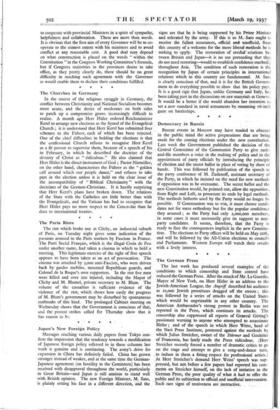Japan's New Foreign Policy Messages reaching various daily papers from
Tokyo con- firm the impression that the tendency towards a modification of Japanese foreign policy referred to in these columns last week is genuine and is continuing. The army's drive for expansion in China has definitely failed. China has grown stronger instead of weaker, and at the same time the German- Japanese agreement (on hostility to the Comintern) has been received with disapproval throughout the world, particularly in Great Britain—and Japan is still anxious to stand well with British opinion. The new Foreign Minister, M. Sato, is plainly setting his face in a different direction, and the signs are that he is being supported by his Prime Minister and tolerated by the army. . If this is so M. -Sato ought to receive the fullest assurances, official and unofficial, from this country of a welcome for the more liberal methods he is seeking to -apply. The restoration of cordial relations be- tween Britain and Japan—it is no use pretending that they do not need restoring—would re-establish confidence markedii throughout Asia. The condition of such restoration is the recognition by Japan of certain principles in international relations which to this country are fundamental. M. Sato is clearly conscious of that, and it is for the British Govern- ment to do everything possible to show that his policy pays. It is a good sign that Japan, unlike Germany and Italy, ha; been taking part in the discussions on raw materials at Geneve. It would be a better if she would abandon her intention to set a new standard in naval armaments by. mounting j6-inch guns on battleships.
* * * *




































































 Previous page
Previous page